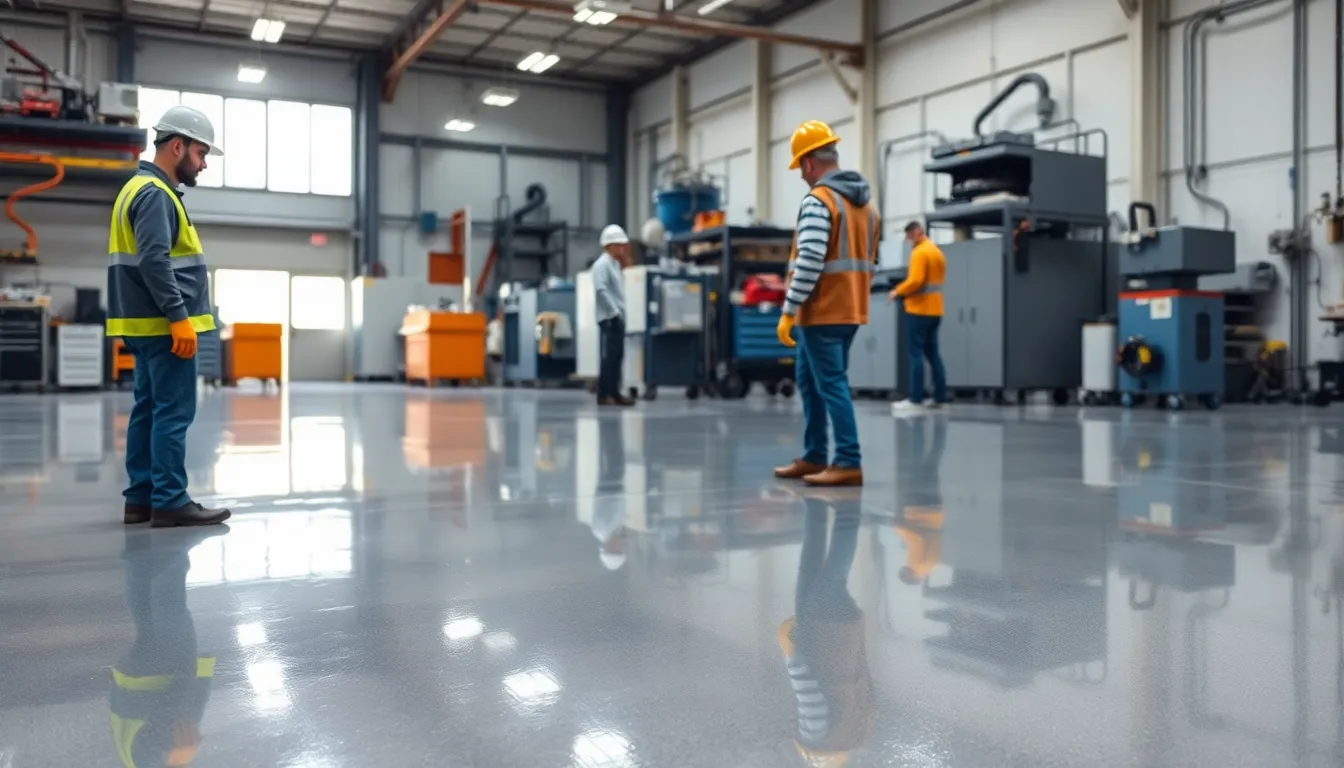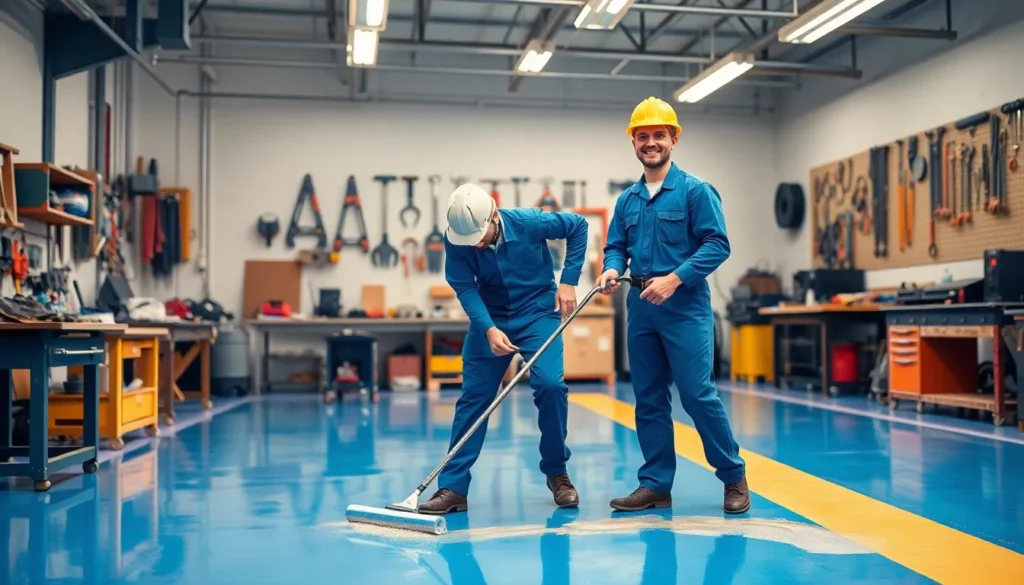Table of Contents
ToggleIn the bustling world of workshops, where creativity meets chaos, the floor often takes a beating. Oil spills, paint splatters, and the occasional rogue toolbox can turn a pristine surface into a disaster zone faster than you can say “safety hazard.” But fear not! Floor coating is here to save the day and your sanity.
Overview of Floor Coating for Workshops
Floor coating serves as a vital component for workshops, protecting surfaces from damage caused by tools, chemicals, and heavy equipment. A durable coating not only shelters the floor but also enhances safety by reducing slip hazards.
Polyurethane, epoxy, and polyaspartic are the most common types of floor coatings used in workshops. Each type offers distinct benefits. For example, epoxy coatings provide excellent chemical resistance, making them suitable for areas where spills frequently occur. On the other hand, polyaspartic coatings cure quickly, allowing for rapid deployment with minimal downtime.
Workshops often experience high foot and vehicle traffic, necessitating a robust floor coating solution. Various formulations exist to withstand the wear and tear typical in these environments. These formulations may also include anti-slip additives, enhancing traction and safety for workers.
Application methods also play a role in determining the effectiveness of floor coatings. Often, professionals apply coatings using rollers, brushes, or sprayers to ensure even distribution and proper adhesion. Surface preparation remains crucial; properly cleaning and priming the floor surface enhances bond strength, ensuring longevity.
Color options and finishes provide flexibility in design, allowing workshop owners to select coatings that match their branding or enhance visibility. Additionally, many coatings are low in volatile organic compounds, making them environmentally friendly while maintaining performance.
Investing in high-quality floor coating solutions creates a resilient and aesthetically pleasing environment. The right choice significantly improves safety, organization, and overall efficiency in workshop operations.
Types of Floor Coatings

Various floor coatings offer unique advantages for workshop environments. Understanding these options helps in selecting the right coating for specific needs.
Epoxy Coatings
Epoxy coatings create a strong, durable surface that withstands heavy foot and vehicle traffic. They often feature excellent chemical resistance, making them ideal for workshops where spills occur. Many epoxy formulations cure quickly, allowing for rapid installation and minimal downtime. Their glossy finish enhances visibility while making cleaning easier. Maintenance remains low, ensuring that the floor retains its appearance for years.
Polyurethane Coatings
Polyurethane coatings provide a flexible and resilient surface that adapts well to temperature changes. This type of coating exhibits superior abrasion resistance, making it suitable for workshops with intense machinery use. Available in multiple finishes, it allows for customization based on aesthetic preferences. Polyurethane is also UV stable, preventing color fading from sunlight exposure. These coatings often include anti-slip properties, further improving safety in high-traffic areas.
Acrylic Coatings
Acrylic coatings offer quick-drying options that suit busy workshops needing minimal downtime. These products allow for easy application and can often be completed within a day. They provide sufficient protection against spills and wear, making them a practical choice for many workshops. Many acrylic options include a matte finish, which helps hide imperfections and maintains a clean look. Their compatibility with other coatings enables layering for enhanced durability.
Benefits of Floor Coating for Workshops
Floor coatings provide essential advantages for workshops, ensuring significant protection and maintenance of surfaces.
Durability and Longevity
Durability defines the core of floor coatings. Epoxy and polyurethane options resist wear caused by heavy machinery and frequent foot traffic. Long-lasting solutions stand up to impacts and abrasions, which minimizes the need for frequent repairs. Workshops benefit from coatings designed to endure thick spills and tough cleaning processes. Consistent use of high-quality materials promotes longevity, contributing to a cost-effective investment for workshop operators.
Safety and Slip Resistance
Slip resistance significantly enhances safety in workshops. Many coatings incorporate anti-slip additives that prevent accidents caused by spills and debris. Improved traction on surfaces protects staff as they move with tools and equipment. The addition of slip-resistant materials helps lower the risk of falls, fostering a safer workspace overall. Workshops often exhibit high activity levels, which make maintaining safety a priority.
Aesthetic Appeal
Aesthetic appeal influences the overall work environment. Coatings come in various colors and finishes, allowing customization based on workshop themes. Glossy surfaces improve visibility and enhance overall illumination, contributing to a more professional look. Enriched aesthetics promote a positive atmosphere, which can boost employee morale and productivity. An attractive floor also signals attention to detail and quality, instilling confidence in clients and visitors.
Factors to Consider When Choosing Floor Coating
Selecting the right floor coating for a workshop involves several important factors. Each element contributes to a safer and more effective working environment.
Workshop Environment
The type of workshop plays a significant role in coating selection. Heavy manufacturing workshops require coatings that withstand intense wear, while light-duty workspaces need options that prioritize aesthetics and ease of maintenance. Exposure to chemicals and liquids must also inform the choice; coatings with strong chemical resistance are crucial. Additionally, temperature extremes impact coating longevity, so selecting materials suitable for fluctuating conditions proves essential.
Application Process
Preparation is key for successful application of floor coatings. Surface cleaning and repair often precede coating application to ensure optimal adhesion. Many coatings require specific temperatures and humidity levels for proper installation; understanding these conditions facilitates a smoother process. While some coatings self-level, others may require skilled labor to apply evenly. Consideration of curing times also factors into project timelines, influencing how quickly the workshop can resume operations.
Maintenance Requirements
Regular maintenance can prolong the life of floor coatings. Each type of coating has distinct maintenance needs, so awareness of these requirements helps in decision-making. For instance, epoxy may necessitate less frequent upkeep due to its durability, while acrylics may need more regular cleaning. Simple practices like mopping and occasional reapplication of protective topcoats can significantly enhance longevity. Understanding the specific maintenance needs ensures consistent performance and appearance, supporting a safer workshop environment.
Investing in floor coatings for workshops is a smart choice that enhances both safety and efficiency. With options like epoxy and polyurethane available, workshops can find the right solution to withstand heavy use and protect against spills. The added anti-slip features not only promote safety but also contribute to a more organized workspace.
Choosing the right coating tailored to the specific workshop environment can lead to significant long-term benefits. Regular maintenance ensures these surfaces remain in top condition, minimizing downtime and repair costs. Overall, high-quality floor coatings transform workshops into safer and more productive environments, reflecting a commitment to employee well-being and operational excellence.





